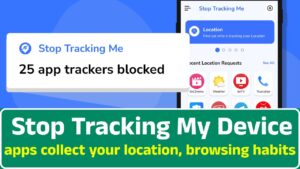Tracking My Device
What is Device Tracking?
Device tracking is how companies, governments and apps collect your location, browsing habits, app usage, movements, and personal information — often without your clear permission. It uses GPS, Wi-Fi, Bluetooth, cellular networks, apps, and even web browsers.

Why You Should Care
- Privacy loss: Your habits, movements, and preferences are constantly monitored.
- Security risk: Hackers can use tracking to plan attacks.
- Financial risk: You can be profiled for ads or scams.
- Identity theft: Your personal info can be leaked or stolen.
How Devices Are Tracked
- GPS signals trace your exact location.
- Wi-Fi networks log your movements.
- Mobile carriers can track you via tower triangulation.
- Bluetooth devices nearby can pinpoint you.
- Apps and websites collect data through permissions and cookies.
- Operating Systems (Android, iOS, Windows, macOS) send telemetry data.
- Hidden tracking via ads, ultrasonic signals, and fingerprinting.
Signs of Being Tracked
- Your phone heats up or battery drains unusually fast.
- Strange apps appear.
- Your mobile data usage spikes.
- Your device behaves oddly.
- You get creepy targeted ads.
Risks and Dangers
- Targeted advertising that invades privacy.
- Stalking or harassment risks.
- Fraud and scams tailored using your data.
- Government surveillance in certain regions.
How to Stop Tracking on Different Devices
On Android:
- Turn off location.
- Control app permissions tightly.
- Disable ad personalization.
- Use privacy browsers and VPNs.
- Disable Bluetooth and Wi-Fi when not needed.
On iPhone:
- Turn off app tracking.
- Manage location permissions carefully.
- Use Private Relay (iCloud+).
- Disable frequent location tracking.
On Windows:
- Turn off location services and telemetry.
- Use a local account (not Microsoft login).
- Install privacy tools like O&O ShutUp10.
On MacBooks:
- Disable unnecessary location tracking.
- Use Safari’s privacy features.
- Block ad trackers and third-party cookies.
Browser Tracking and How to Block It
- Use privacy browsers (Brave, DuckDuckGo, Firefox).
- Block cookies and third-party scripts.
- Install tracker-blocking extensions.
- Clear browsing data regularly.
Best Apps and Tools for Privacy
- VPNs: NordVPN, ProtonVPN.
- Privacy Browsers: Brave, Firefox Focus.
- Encrypted Messaging: Signal, Telegram.
- Private Email Services: ProtonMail, Tutanota.
Physical Device Security
- Always update your device.
- Encrypt your phone or computer.
- Use strong passwords and two-factor authentication.
- Check for AirTags or hidden Bluetooth trackers nearby.
Advanced Privacy Protection
- Use a Faraday bag to block all wireless signals.
- Set up your own private VPN or Tor node.
- Use privacy-focused DNS like NextDNS.
- Build fake online profiles for non-critical signups.
Your Legal Rights
- Laws like GDPR (Europe) and CCPA (California) protect some of your data rights.
- You can request companies delete your data.
- You can file complaints with Data Protection Authorities if your data is misused.
How Tracking is Becoming Smarter
Even if you disable GPS, companies can still track:
- Via Bluetooth and Wi-Fi signals.
- By how you move your phone (motion sensors).
- By fingerprinting your device through hardware details.
- By microphone and ultrasonic tracking.
Common Myths
- “Incognito mode protects everything” — False! It mainly hides history locally.
- “Turning off GPS makes you invisible” — False! Wi-Fi and Bluetooth can still leak your location.
- “Only big companies track you” — False! Even small apps and free services do.
Future of Tracking
- Smart cities, facial recognition, AI surveillance are expanding.
- Governments and corporations are integrating more surveillance technologies.
- New privacy tools are also emerging, offering hope for better protection.
Conclusion
Complete privacy may be impossible today, but by following simple steps like disabling tracking settings, using privacy tools, and being more cautious, you can dramatically reduce how much you’re tracked.
Protecting your digital privacy is not a one-time job — it’s a habit.
Stay informed. Stay private.
